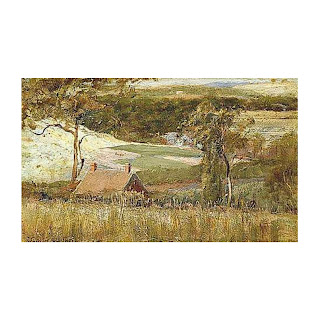I decided to research a nearby house I've long been
fascinated by. I found the property has no real estate sales history on line. On
Google I found a footnote in a book by Anne Sommers, 'The Lost Mother: A
Story of Art and Love', 2010. The book itself is a detective story into a portrait of
Anne's mother by Constance Stokes. The house I have discovered was the home of
William Beckwith McInnes, 1889-1939, and his artist wife, Violet Muriel
Musgrave. McInnes was a portrait painter who won the Archibald seven times,
exhibited at the London Royal Academy and succeeded Frederick McCubbin as head
of drawing at the National Gallery School. Later McInnes became head of
painting at the school after Bernard Hall's death. He was also a landscape
painter who frequently painted his local area of Lucerne in Alphington. He
lived with Violet here from 1915. The photo is a real estate shot and does the
house no justice. It's a magical sloping garden with impeccable detail and the
house is set to the back of the property near the Yarra River.
Anne Summers PhD AO, is a leading feminist writer and
journalist who has a connection with the following owners of the house who were
Russian art collectors of Constance Stokes.
 |
| A real estate photo of the house |
 |
| An Archibald winning
painting by McInnes 1923 |
 |
| A Lucerne 'urban'
landscape with Kew Asylum in the background |
.jpg)
.jpg)







































